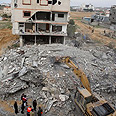
Destruction after Gaza op
Photo: AP
Operation Cast Lead
was not a war pitting equal forces against each other and was not beyond the scope of many past Israeli operations. However, I believe that its strategic importance is much greater than we assume, and that this is a milestone that would be etched in the historic memory of the Middle East for many years. This is not necessarily because of the narrow military aspect, even though the military achievements are clear.
First, the IDF restored its deterrence vis-à-vis Hamas. This holds great significance to the deterrence vis-à-vis other Mideastern players, mostly Hizbullah in the north and the Iran-Syria axis. Even the Second Lebanon War, which was managed in a flawed manner, looks different today in light of the capabilities showcased by the IDF in the latest operation. As opposed to common perceptions, the IDF showed that it possesses the means, combat doctrine, and required determination for fighting in a crowded urban area while ensuring minimal casualties among our forces.
Other Effects
Associated Press
At Economic Forum in Davos, Erdogan tells Peres 'you are killing people'; Israeli president responds: You would do the same if rockets would fall on Istanbul
Secondly, Hamas’ rocket fire ended unconditionally. It is of course possible that Hamas leaders, who are only now digesting the disaster they brought upon themselves and their people, will recover eventually and go back to their old ways. Yet then they will have to take into account the fact that the IDF could again strike at them whenever it wishes to do so, and it is doubtful whether the Gaza population would allow them to prompt another similar blow against it.
Thirdly, and most importantly, the asymmetrical rules of the game that Israel appeared to accept in recent years had been broken. Previously, it appeared as though the weak side (Hamas, Hizbullah) could attack Israeli citizens uninterruptedly, while Israel hesitates in utilizing its substantial military power (airplanes, tanks, and guided missiles) for fear of hurting civilians on the other side. Yet the recent operation showed that even mosques used by terror groups are no longer an obstacle in the face of Israel using its military power.
The attack on the Kissufim Road earlier this week is also related to the new rules of play. Hamas was forced to stop the rocket fire and attacks on civilians, yet it is trying to show that attacking soldiers is allowed. We must not agree to this, of course, and we have the power to enforce the rules of play that are desired by us, which shall also include a ban on Hamas activity in the Strip within a few hundred meters of the border fence.
Path of resistance has failed
Meanwhile, the operation’s diplomatic achievements are significant and no less important than the military ones.
The first diplomatic achievement is the destabilization of Iran’s position in the Mideast in the wake of the blow sustained by its protégé in Gaza. Moreover, most of the Arab world crossed the lines and stood by Egypt vis-à-vis Hamas. This closer step to Israel and the recognition of the common interest against Iran and its emissaries holds immense strategic importance.
The second achievement is the unequivocal support offered by Western leaders to the Israeli position regarding the prevention of Hamas’ military buildup in Gaza. Understandings and agreements on curbing the smuggling have been signed and secured vis-à-vis the US and most western European states.
The third achievement is ending the war without Israel recognizing Hamas – not even indirectly.
All of the above puts Hamas’ leadership at a crossroads. It discovered that it cannot simultaneously raise the banners of sovereignty and resistance. It is for good reason that there is no precedent for this anywhere in the world. It will have to decide what is more important: Being the sovereign in an Islamic state, or enjoying the benefits of being a terror movement.
For the time being, it appears that the path of resistance has failed, big time.















